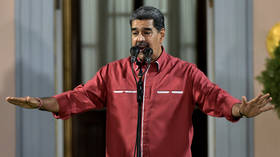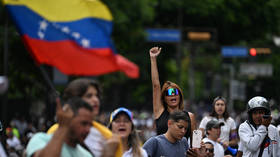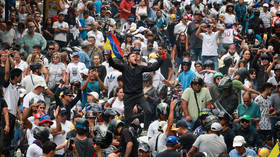Washington’s web of lies is backfiring over Venezuela

The 2024 presidential election in Venezuela, held on July 28, has stirred international concern – much like the preceding elections in the Caribbean state. A clear divide has emerged, with the United States and its allies supporting the opposition, while countries in the emerging multipolar world order are backing President Nicolas Maduro.
In much the same way that the US and its allies have disputed the legitimacy of Maduro’s presidency since the 2018 election, spurring an artificial “presidential crisis” with former opposition leader Juan Guaido recognized by Washington as the “legitimate” president, the West is doing this again with former diplomat Edmundo Gonzalez.
The opposition has released copies of official tally sheets collected by poll watchers from most of the nation’s polling centers. The sheets show an apparent landslide victory of 80% for Gonzalez, a claim that is now being widely circulated and amplified by the Western press.
Meanwhile, the results released by the National Electoral Council showed a narrow victory for Maduro with 52%, resulting in opposition protests. The Venezuelan government has criminalized such demonstrations and moved to stamp down opposition leaders.
Given the state of the Venezuelan economy and widespread poverty, it is not outside the realm of basic reason that Maduro could have actually lost. Researchers, including Steve Levitsky, an expert on democracy at Harvard University, have also noted how improbable the official results are. He told the New York Times that this recent vote is “one of the most egregious electoral frauds in modern Latin American history.”
But others disagree. Denis Rogatyuk, a reporter with El Ciudadano who covered the election for the independent media platform, told RT: “The days preceding the election showed a monumental advantage that Nicolas Maduro and the PSUV had over the opposition in terms of manpower and the sheer strength of its electoral mobilization.”
“The closing rallies for President Maduro drew in crowds six to seven times larger than those of Gonzalez and Machado. And the second bulletin released by the CNE on August 2nd, showing 6,408,844 votes for Maduro, aligns perfectly with this notion, and the fact that the combined membership of the PSUV and its allied parties is just over 6 million as well,” he concluded.
However, the more interesting dynamic with regard to the situation in Venezuela is the fact that the US is failing to garner the requisite support needed to apply the pressure it wants on Caracas. It shows a dwindling of American soft power in what was once considered the empire’s backyard.
For example, the situation in Bolivia in 2019, in which former President Evo Morales was forced to resign in the wake of widespread pressure from the police and military after international interference, has clearly left a sour taste in Latin Americans’ collective mouths.
The three most prominent countries in the region – Brazil, Mexico, and Colombia – have not condemned Maduro. In fact, the Organization of American States (OAS), which had previously passed a resolution against Morales in 2019, failed to pass a resolution over the situation in Venezuela. While 17 members voted to condemn Maduro, 11 abstained – including Brazil and Colombia – and five delegations, including Mexico, skipped the session altogether. The OAS needed 18 votes to pass it.
Even the European Union has failed to muster support after Hungary blocked a joint statement by the bloc that would have cited “flaws and irregularities” in the election, forcing EU foreign policy chief Josep Borrell to publish it in a personal capacity.
What we see here is a classic case of the boy who cried wolf. The US has continually cried wolf over alleged breakdowns of democracy in Latin America, using its soft power to thwart independent governments through international forums and mafia diplomacy. It has spawned coup after coup, leaving nothing but destruction and destitution in its wake. People in the hemisphere – and indeed the world – are sick of injustice and maltreatment.
This time, Washington may have actually been right. It could be the case that Maduro lost in this election. It could also not be the case, and that is well-established by the fact that the US and its henchmen are pathological liars. In any case, wherever objective truth may lie, no one believes Uncle Sam’s claims anymore, evidently because he has abused his power for too long in his cynical pursuit of domination.
The statements, views and opinions expressed in this column are solely those of the author and do not necessarily represent those of RT.















